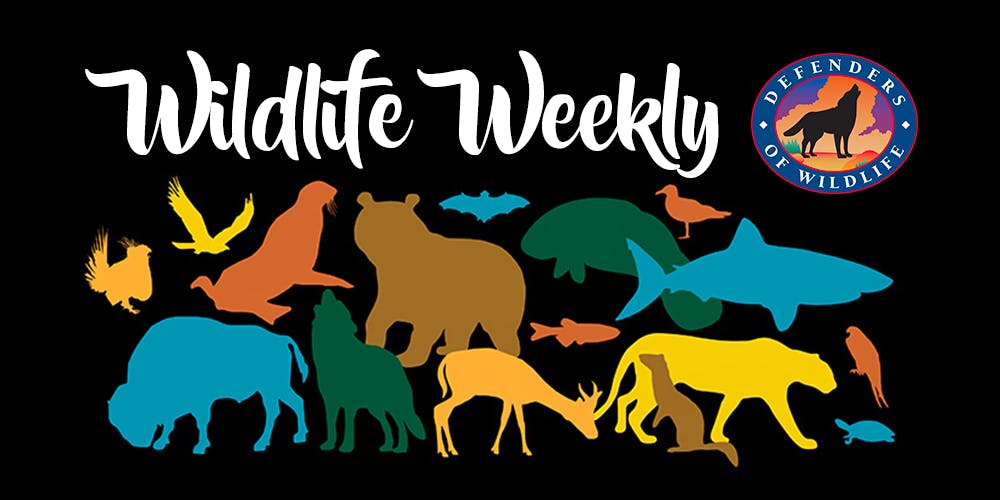Your weekly roundup of wildlife news from across the country.
Wild stories from the Week:
One of the biggest challenges to the effectiveness of the Endangered Species Act (ESA) is the absence of programs to monitor habitat conditions and compliance with ESA permits. To help overcome this challenge, we developed a cost-effective technique to automatically detect three forms of habitat disturbance in endangered species habitat: http://dfnd.us/2vwFgIt
Department of Homeland Security waives environmental laws to speed border wall construction: http://dfnd.us/2u4pBQ7
The Alaska delegation is back at it again, demanding that a road be built right through the middle of the pristine Izembek National Wildlife Refuge. It is becoming increasingly clear that commercial interests are a driving force behind this costly road proposal, which would cause irreparable damage to some of the most important wilderness on the planet: http://dfnd.us/2uQMlQJ
Take a break from your hectic day with this awesome live feed of bears catching salmon at Katmai National Park: http://dfnd.us/2f1VCSh
Scientists are working hard to learn the reason that at least nine North Atlantic right whales have been found dead: http://dfnd.us/2vlUf7V
Wildlife photo project captures candid shots of California animals: http://dfnd.us/2w2AQ9b
Our Defenders in Action:
In North Carolina:

In June, Ben Prater, SE Program Director and Tracy Davids, SE Program Coordinator led an ecological hike overlooking Shining Rock Wilderness, NC for the Appalachian Woodlands Alliance members and forest product industry representatives. Before the hike, participants were treated to a tour of certified sustainable forestry practices on nearby private land.
In Mexico:

Our International Senior Counsel, Alejandra Goyenechea, traveled to Mexico City with other members of the Inter-American Tropical Tuna Commission (IATTC) to the annual meeting to discuss management measures of tuna and by-catch species including sharks. Defenders was at the meeting to continue strong support for a prohibition on at-sea shark fin removal as the best practice for enforcing the IATTC finning ban. We remain deeply concerned about the status of Eastern Pacific shark and ray populations. While the lack of proposals to set IATTC shark and ray fishing limits this year is disappointing, we are encouraged that Parties will once again consider strengthening the IATTC ban on the wasteful practice of shark finning (slicing off a shark’s fins and discarding the body at sea).
In North Carolina:
 This summer Kat Diersen, Defenders Southeast Representative is spending time in the field with partners from the NC Wildlife Resources Commission, USFWS, NC Museum of Natural Sciences and Wingate University to survey parts of the Hiwassee river to detect presence of young eastern hellbender salamanders. Because of impacts from development, damming of rivers, mining and agriculture, the plight of the hellbender is now so dire that the U.S. Fish and Wildlife Service is considering listing the species under the Endangered Species Act. Survey efforts, such as this one, are essential to determine the health of hellbender populations and where efforts need to be focused on protecting and restoring their habitat. Protecting hellbenders and other aquatic species is an important part of Defenders work in the Southern Appalachians, and we are spearheading a coalition of government agencies, NGO’s and academic institutions that works together with private landowners to restore water quality and habitat for the benefit this region’s rich aquatic biodiversity.
This summer Kat Diersen, Defenders Southeast Representative is spending time in the field with partners from the NC Wildlife Resources Commission, USFWS, NC Museum of Natural Sciences and Wingate University to survey parts of the Hiwassee river to detect presence of young eastern hellbender salamanders. Because of impacts from development, damming of rivers, mining and agriculture, the plight of the hellbender is now so dire that the U.S. Fish and Wildlife Service is considering listing the species under the Endangered Species Act. Survey efforts, such as this one, are essential to determine the health of hellbender populations and where efforts need to be focused on protecting and restoring their habitat. Protecting hellbenders and other aquatic species is an important part of Defenders work in the Southern Appalachians, and we are spearheading a coalition of government agencies, NGO’s and academic institutions that works together with private landowners to restore water quality and habitat for the benefit this region’s rich aquatic biodiversity.



